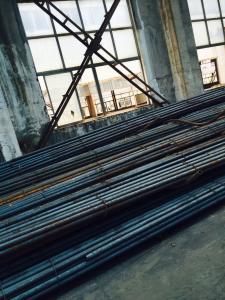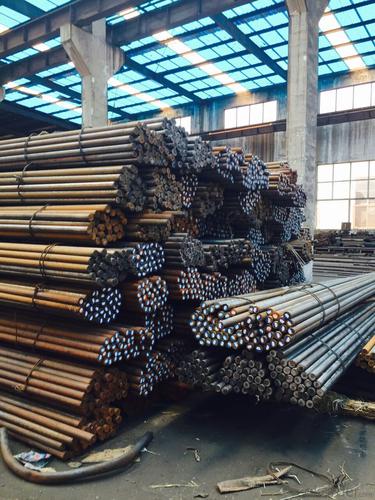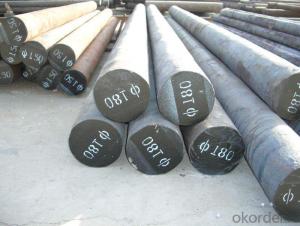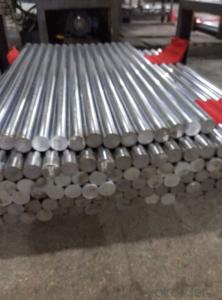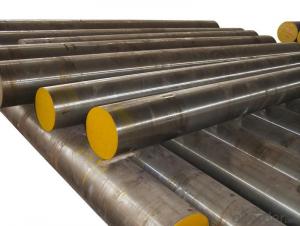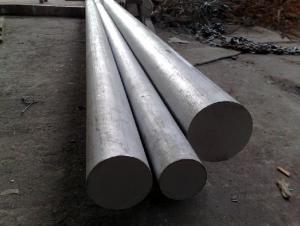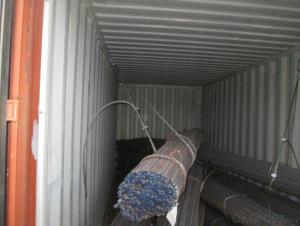52100 Bearing Steel Rounds Hot Rolled Treatment
- Loading Port:
- Tianjin
- Payment Terms:
- TT OR LC
- Min Order Qty:
- 25 m.t.
- Supply Capability:
- 50000 m.t./month
OKorder Service Pledge
OKorder Financial Service
You Might Also Like
Specification
52100 Bearing Steel Rounds Hot Rolled Treatment
Product Description:
Material | suj2 | ||
Chemical Composition | Mechanical Properties(In Quenched & Tempered State) | ||
C | 0.95-1.05 | Tensile strength(MPA) | ---- |
Si | 0.15-0.35 | Yield strength (MPA) | -- |
Mn | 0.25-0.45 | Elongation(δ5/%) | -- |
Cr | 1.40-1.65 | Reduction in Area (ψ/%) | -- |
Mo | ≤0.10 | Impact (J) | -- |
P | ≤0.025 |
Hardness | HB170-207 HB207-229 HB270-390 HB229-285 HRC62-66 HRC61-66 HRC≈67 |
S | ≤0.025 | ||
Ni | ≤0.30 | ||
Cu | ≤0.25 | ||
Ni+Cu | ≤0.50 | ||
Characteristics:
1) Good hardability and high toughness
2) Long fatigue life
3) Medium cold processing plasticity
4) Certain machinability
5) Poor weldability
Application:
1) Steel ball, roller and collar of large machinery bearing
2) High-hardness and high contact fatigue strength machinery parts with heavy load, such as axis of rotation, blade, stator pump, profiling, sleeve, mandril, etc.
Photos of our products:
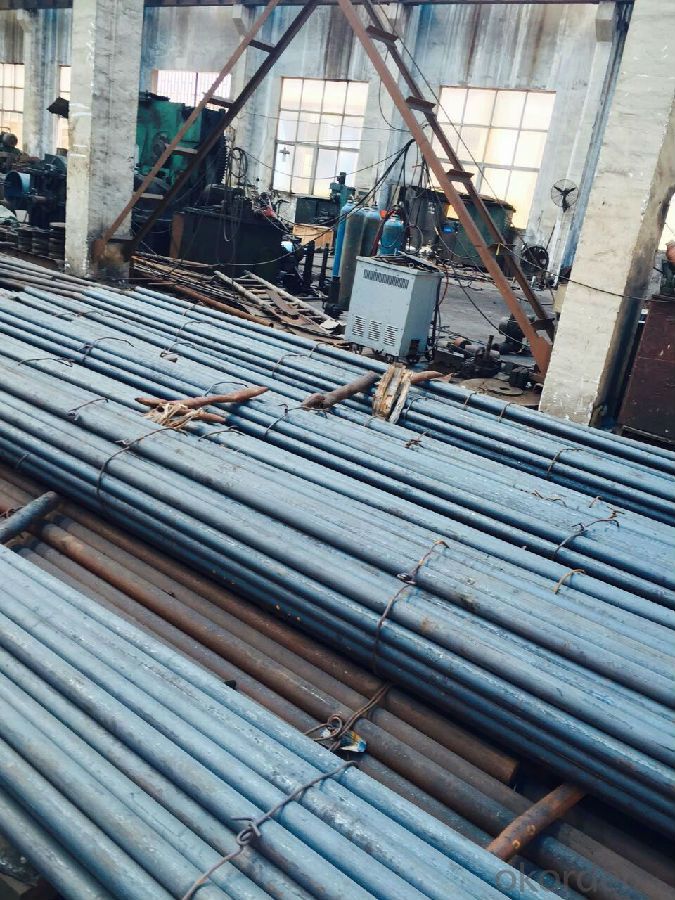
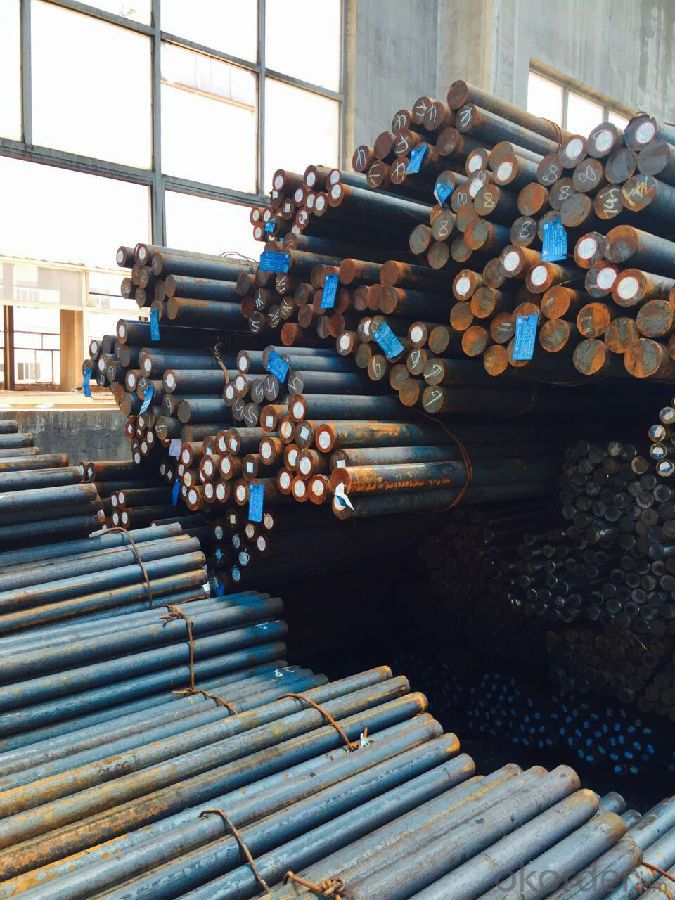
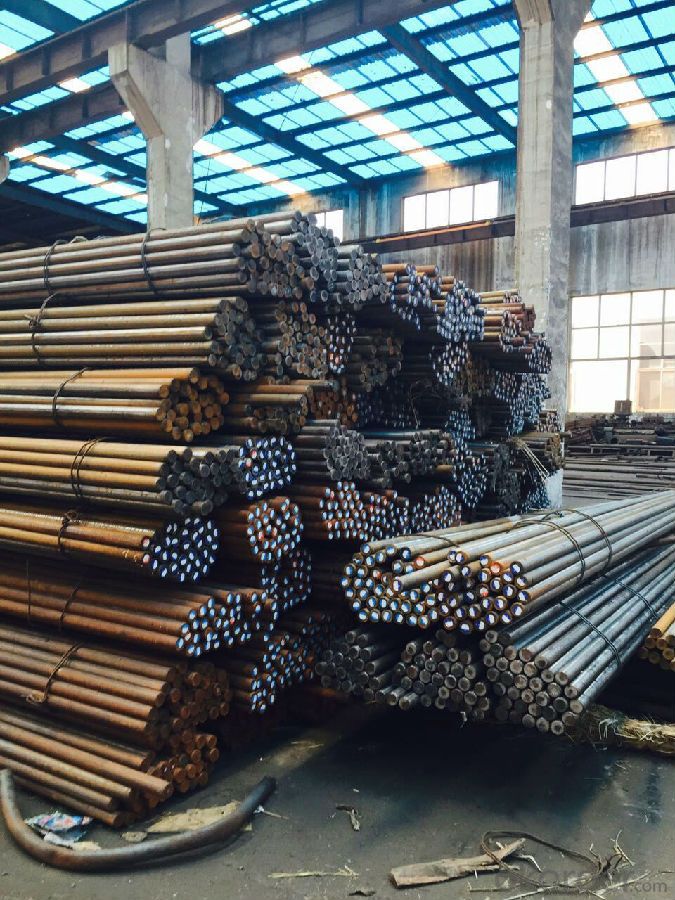
- Q: What are the challenges in machining special steel with complex geometries?
- Machining special steel with complex geometries poses several challenges. Firstly, the high hardness of special steel makes it difficult to cut and shape. This requires the use of specialized cutting tools and techniques to ensure precision and avoid tool wear. Secondly, the complex geometries of the steel components make it challenging to achieve accurate and consistent machining. This may require the use of advanced CNC machines and software programming to accurately replicate the intricate shapes. Additionally, the heat generated during machining can lead to thermal distortion and surface hardening, which further complicates the process. Therefore, careful planning, efficient cooling, and proper machining parameters are essential to overcome these challenges and achieve the desired results.
- Q: What are the properties of corrosion-resistant tool steel?
- Corrosion-resistant tool steel possesses several key properties. Firstly, it exhibits excellent resistance to corrosion, which prevents the formation of rust and other forms of deterioration. Additionally, it maintains its strength and hardness even in harsh environments, making it highly durable and long-lasting. This type of tool steel also demonstrates good wear resistance, minimizing the risk of abrasion and extending its lifespan. Finally, corrosion-resistant tool steel can be easily machined and formed, allowing for precise manufacturing processes.
- Q: How does special steel withstand high-velocity impacts?
- Special steel is able to withstand high-velocity impacts due to its exceptional strength and toughness. It is specifically engineered to have enhanced mechanical properties, such as increased hardness and resistance to deformation. This allows the steel to absorb and distribute the energy from the impact, minimizing the risk of fractures or failure. Additionally, special steel may be heat-treated or alloyed with other elements to further improve its impact resistance, making it an ideal choice for applications where high-velocity impacts are a concern.
- Q: How does special steel contribute to the longevity of products?
- Special steel contributes to the longevity of products by providing enhanced strength, durability, and resistance to wear and corrosion. Its unique composition and manufacturing processes make it ideal for applications where strength and longevity are crucial, such as in the automotive, aerospace, and construction industries. By using special steel, products can withstand extreme conditions and heavy use over extended periods, ensuring a longer lifespan and reducing the need for frequent replacements.
- Q: What are the main characteristics of structural steel forgings?
- The main characteristics of structural steel forgings include high strength, excellent toughness, and superior fatigue resistance. They are also known for their ability to withstand extreme temperatures and harsh environments. Moreover, structural steel forgings exhibit good weldability and machinability, making them suitable for various engineering applications.
- Q: What are the emerging trends in special steel production?
- Some of the emerging trends in special steel production include the use of advanced technologies, such as additive manufacturing and automation, to enhance efficiency and precision in the production process. Additionally, there is a growing demand for eco-friendly and sustainable production methods, leading to the development of greener steelmaking processes. Furthermore, there is a focus on creating specialty steels with improved properties, such as higher strength, corrosion resistance, and heat resistance, to meet the evolving needs of various industries.
- Q: How does special steel comply with international standards?
- Special steel complies with international standards through a rigorous quality control process that involves testing the material for its chemical composition, mechanical properties, and dimensional accuracy. These standards, such as ISO, ASTM, and DIN, ensure that the steel meets the required specifications and performance criteria for various applications. Manufacturers also follow strict production guidelines and undergo regular audits to maintain compliance with these international standards.
- Q: What are the different welding methods used for special steel?
- There are several welding methods used for special steel, including Tungsten Inert Gas (TIG) welding, Metal Inert Gas (MIG) welding, Shielded Metal Arc Welding (SMAW), Flux-Cored Arc Welding (FCAW), and Submerged Arc Welding (SAW). These methods are chosen based on factors such as the type of steel, joint design, thickness, and desired welding quality.
- Q: How does special steel contribute to the elasticity of products?
- The elasticity of products is improved by special steel, which has a distinct composition and manufacturing process. Elasticity refers to a material's capacity to revert to its initial shape or size after being stretched or deformed. Special steel enhances product elasticity in multiple ways. Firstly, special steel is commonly alloyed with elements like nickel, chromium, or vanadium, which enhance its mechanical properties. These alloying elements alter the steel's crystal structure, resulting in a material with higher yield strength and tensile strength. This increased strength enables the steel to endure higher levels of stress and deformation without permanent damage or failure. Furthermore, the manufacturing process of special steel involves precise control over its microstructure. Techniques such as heat treatment and cold working optimize the steel's grain size and distribution. This controlled microstructure improves the material's elasticity by facilitating uniform deformation. When a product made from special steel faces external forces or stress, its microstructure allows for the redistribution of these forces, minimizing localized deformation and maximizing overall elasticity. Moreover, special steel often contains a high carbon content, which contributes to its elasticity. The carbon atoms in the steel form strong chemical bonds with the iron atoms, resulting in a material with increased hardness and resistance to deformation. This enhanced resistance to deformation enables the steel to exhibit greater elasticity when subjected to external forces. In conclusion, special steel's unique composition, precise manufacturing processes, and specific alloying elements all contribute to its ability to enhance product elasticity. By incorporating special steel in the design and construction of various products, manufacturers can ensure that these products can withstand deformation and return to their original shape, thus increasing their durability and longevity.
- Q: What are the main characteristics of magnetic steel?
- Magnetic steel, also referred to as ferromagnetic steel, possesses several essential features that render it highly suitable for a wide range of industrial applications. Firstly, magnetic steel demonstrates a robust magnetic field, enabling it to attract and retain magnetic materials. This quality plays a vital role in the production of electrical devices like motors, transformers, and generators, where the steel is utilized to establish magnetic circuits and enhance the efficiency of electromagnetic processes. Another significant aspect of magnetic steel is its high saturation magnetization, indicating its ability to reach maximum magnetic flux density under a given magnetic field strength. This attribute guarantees that magnetic steel can maintain a powerful magnetic field even when subjected to external forces or fluctuations in the magnetic field. Such stability and reliability render it ideal for applications that demand consistent magnetic performance. Moreover, magnetic steel exhibits exceptional electrical conductivity, which is of utmost importance in applications where the steel serves as a core material for electrical circuits. The superior electrical conductivity of magnetic steel minimizes energy losses and facilitates effective power transmission and distribution. Additionally, magnetic steel possesses a high coercivity, which denotes its capability to resist demagnetization. This characteristic is crucial in applications where the steel is exposed to fluctuating magnetic fields or mechanical stresses, as it ensures the long-term stability of its magnetic properties. In summary, the principal characteristics of magnetic steel encompass a strong magnetic field, high saturation magnetization, excellent electrical conductivity, and high coercivity. These properties establish magnetic steel as an indispensable material in various industries, including electrical engineering, power generation, and magnetic product manufacturing.
Send your message to us
52100 Bearing Steel Rounds Hot Rolled Treatment
- Loading Port:
- Tianjin
- Payment Terms:
- TT OR LC
- Min Order Qty:
- 25 m.t.
- Supply Capability:
- 50000 m.t./month
OKorder Service Pledge
OKorder Financial Service
Similar products
Hot products
Hot Searches
Related keywords

